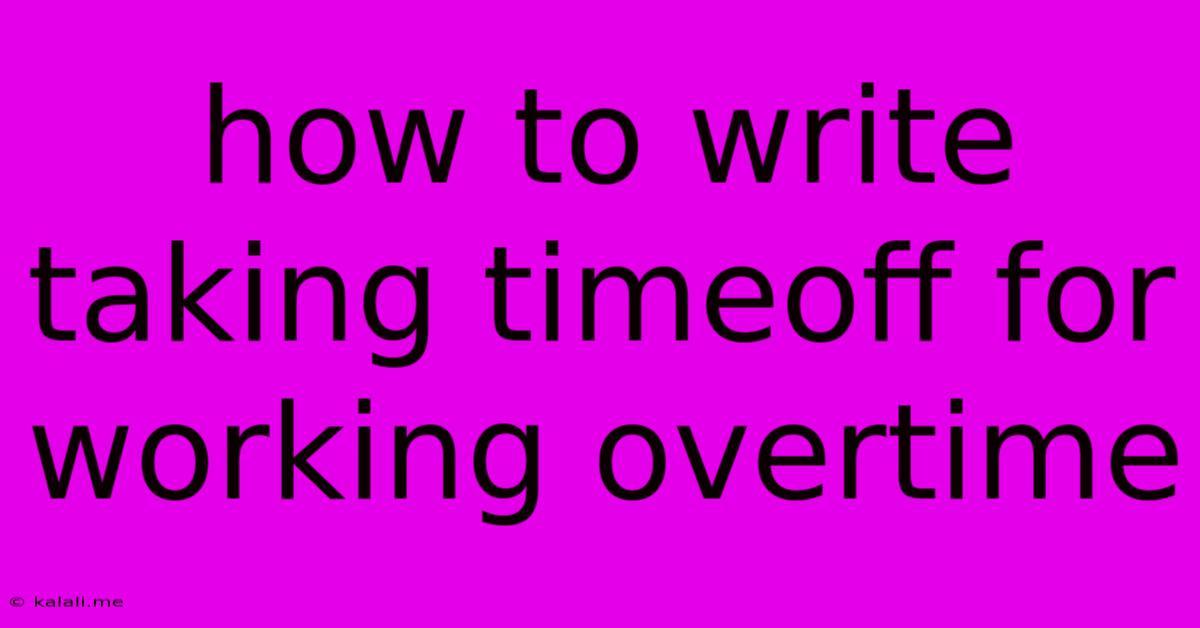How To Write Taking Timeoff For Working Overtime
Kalali
Jun 04, 2025 · 3 min read

Table of Contents
How to Write a Request for Time Off After Working Overtime
Working overtime can be necessary, but it's crucial to ensure you get the appropriate time off to rest and recharge. This article will guide you on how to effectively request time off after putting in extra hours, ensuring your request is clear, professional, and approved. This includes crafting the perfect email or written request, navigating potential employer concerns, and understanding your rights regarding compensatory time.
Understanding Your Rights and Company Policies
Before crafting your request, familiarize yourself with your company's policies regarding overtime and compensatory time off (comp time). Some companies offer paid time off (PTO) that can be used for overtime recovery, while others may have specific policies on accruing comp time. Check your employee handbook or contact HR to clarify your rights and the proper procedures. Knowing your company's policies will help you structure your request appropriately. It's also important to understand any limitations on the amount of comp time you can accrue or use.
Crafting Your Request: The Key Elements
Whether you're emailing your supervisor or submitting a formal written request, your communication should be clear, concise, and professional. Here's a breakdown of what to include:
-
Subject Line: Keep it straightforward, like "Time Off Request - [Your Name]" or "Request for Compensatory Time Off".
-
Clear and Concise Explanation: State your intention clearly. For example: "I am requesting [number] days of paid time off/compensatory time off following my recent overtime work on [projects/tasks]." Be specific about the dates you need off.
-
Quantify Your Overtime: Mention the extra hours you worked. For example, "I worked an additional 15 hours last week on the Alpha project." This provides context for your request.
-
Professional Tone: Maintain a respectful and professional tone throughout your request. Avoid complaining or expressing frustration about the extra work. Focus on the need for rest and recovery.
-
Proposed Dates: Specify the exact dates you wish to take off. If flexible, suggest a range of dates.
-
Offer Solutions (if applicable): If possible, offer solutions to ensure workflow continuity during your absence. For instance, "I've already completed [task] and have delegated [task] to [colleague]."
-
Closing: Thank your supervisor for their consideration and reiterate your commitment to your work. For example, "Thank you for your time and consideration. I am committed to meeting all deadlines and maintaining productivity."
Example Email Request:
Subject: Time Off Request - John Doe
Dear [Supervisor's Name],
I am writing to request [number] days of paid time off/compensatory time off, from [start date] to [end date]. This request follows my recent overtime work on the Alpha project, where I contributed an additional 15 hours over the past two weeks.
I understand the importance of maintaining productivity and have already completed [task] and delegated [task] to [colleague] to ensure a smooth workflow during my absence.
Thank you for your time and consideration. I am committed to meeting all deadlines and maintaining productivity.
Sincerely, John Doe
Navigating Potential Employer Concerns
Your supervisor might have concerns about your request. Be prepared to address these concerns professionally and proactively. This might involve discussing your workload, offering alternative solutions, or highlighting your ongoing commitment to the company.
Remember that your request is a business matter, not a personal plea. Keep it focused on the professional aspects of your work and your need for rest to maintain optimal performance.
Following Up
After submitting your request, follow up with your supervisor after a reasonable amount of time if you haven't received a response. A polite email or a quick in-person conversation is sufficient. Maintaining respectful communication throughout the process is crucial.
By following these guidelines, you can confidently and effectively request time off after working overtime, ensuring you get the rest you deserve while maintaining a positive professional relationship with your employer.
Latest Posts
Latest Posts
-
Can You Use A Schrader Tube On A Presta Rim
Jun 06, 2025
-
How To Get Cat Hair Off Clothes
Jun 06, 2025
-
How Much Do I Tip A Barber
Jun 06, 2025
-
Will Super Glue Work On Plastic
Jun 06, 2025
-
Best Paint To Paint A Door
Jun 06, 2025
Related Post
Thank you for visiting our website which covers about How To Write Taking Timeoff For Working Overtime . We hope the information provided has been useful to you. Feel free to contact us if you have any questions or need further assistance. See you next time and don't miss to bookmark.